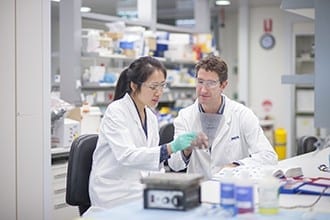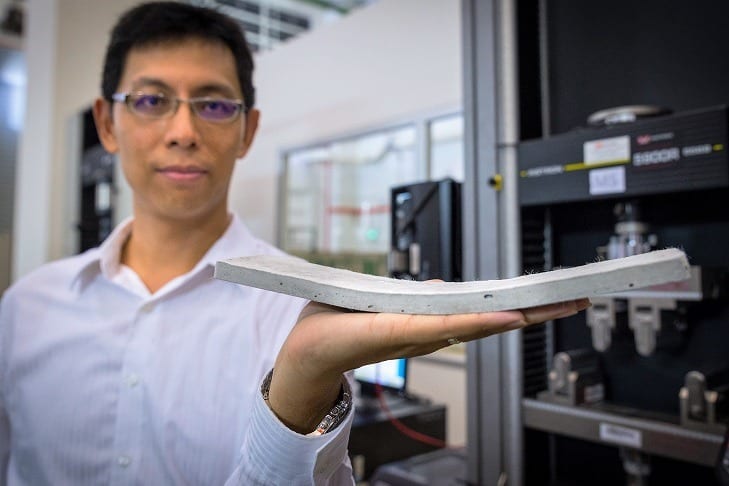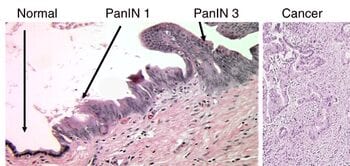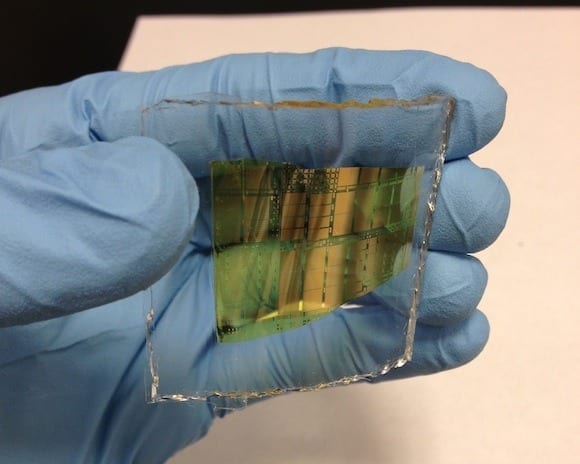
Melbourne researchers have shown a type of leukaemia can be successfully ‘reversed’ by coaxing the cancer cells back into normal development.
The discovery was made using a model of B-progenitor acute lymphoblastic leukaemia (B-ALL), the most common cancer affecting children.
Researchers from the Walter and Eliza Hall Institute showed that switching off a gene called Pax5 could cause cancer in a model of B-ALL, while restoring its function could ‘cure’ the disease.
Institute researchers Dr Ross Dickins and Ms Grace Liu led the study with institute colleagues and collaborators in Vienna. The study was published today in the journal Genes & Development.
Ms Liu said the team used a newly developed ‘genetic switch’ technology to inhibit then reactivatePax5 in the leukaemia model.
“Along with other genetic changes, deactivating Pax5 drives normal blood cells to turn into leukaemia cells, which has been shown before,” Ms Liu said. “However we showed for the first time that reactivating Pax5 enabled the cells to resume their normal development and lose their cancer-like qualities, effectively curing the leukaemia. What was intriguing for us was that simply restoring Pax5 was enough to normalise these cancer cells, despite the other genetic changes.”
Read more . . .
The Latest on: Gene switch reverses cancer
[google_news title=”” keyword=”Gene switch reverses cancer” num_posts=”10″ blurb_length=”0″ show_thumb=”left”]
via Google News
The Latest on: Gene switch reverses cancer
- Gene Therapy Newson April 27, 2024 at 5:00 pm
Genetic Signature May Predict Response to Immunotherapy for Non-Small Cell Lung Cancer Feb. 23, 2024 — A new study identified a set of 140 genes that may help predict enhanced disease-free ...
- Gene therapy is halting cancer. Can it work against brain tumors?on April 19, 2024 at 11:58 am
Tumors must have a mutation found in approximately 20% of glioblastomas, and that can be identified by the UCSF500 cancer gene panel test. The second study will be open to glioblastoma patients ...
- Mutations in noncoding DNA become functional in some cancer-driving geneson April 17, 2024 at 5:00 pm
Researchers, using an experiment that elucidated the function of tens of thousands of noncoding variants, discovered a link between functional mutations and genes linked to cancer pathways ...
- Sex, diet, genes: what men need to know about prostate canceron April 8, 2024 at 3:10 pm
The number of men with prostate cancer is expected to double worldwide by 2040 — from 1.4 million cases in 2020 to 2.9 million annually, according to new figures. The charity Prostate Cancer UK ...
- Scientists 'switch off' breast canceron April 5, 2024 at 5:00 pm
Scientists have managed to 'switch off' breast cancer for the first time. They found removing a single gene from mice halted tumour growth and even reversed it in some cases. Their study could ...
- Researchers turn back the clock on cancer cells to offer new treatment paradigmon March 27, 2024 at 1:20 pm
First author Sandi Radko-Juettner, PhD, a former St. Jude Graduate School of Biomedical Sciences student, now a Research Program Manager for the Hematological Malignancies Program and senior ...
- What is cancer?on March 19, 2024 at 4:48 am
1 in 2 people in the UK will get cancer in their lifetime. Thanks to research many people are cured. Cancer starts when gene changes make one cell or a few cells begin to grow and multiply too much.
- Response to gene-targeted drugs depends on cancer typeon October 22, 2023 at 10:05 am
measuring changes in ‘on and off switch’ molecules in cells linked to seven well-known cancer genes. They found that drugs that blocked the common cancer gene PI3K, including an experimental drug ...
- Inherited cancer genes and increased cancer riskon April 5, 2023 at 6:13 pm
People in some families have a higher risk of developing cancer due to inherited faulty genes.
- Breast Cancer Resource Centeron January 3, 2023 at 7:53 am
Get it checked by a doctor, but don't panic. Chances are, your breast cancer isn't caused by a faulty gene. But in about 5% to 10% of cases, the cause is hereditary. Some lifestyle factors may ...
via Bing News










